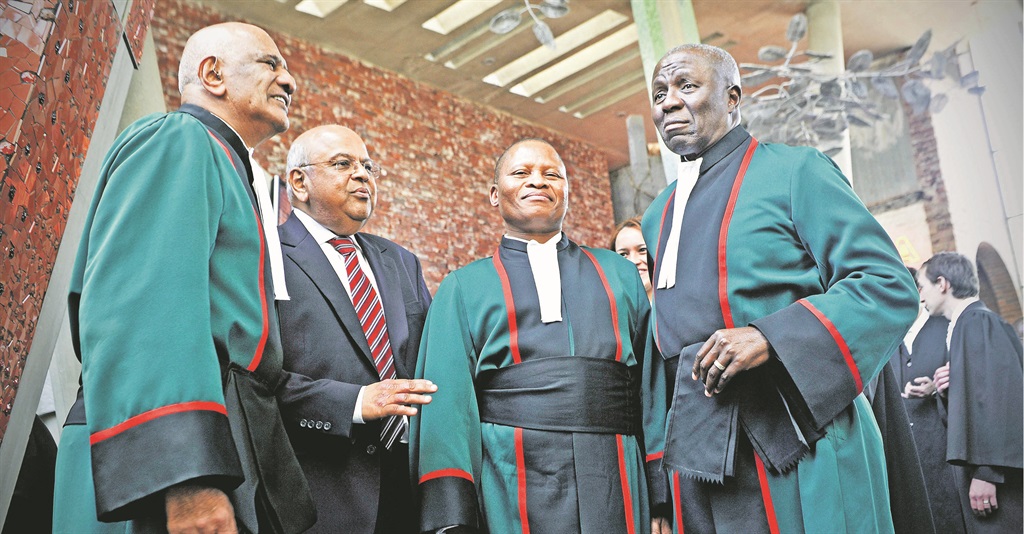
Having hung up his robe on Friday, the deputy chief justice leaves a judiciary strengthened by his exemplary service, brilliant legal mind and fearless outspokenness on injustice
About two weeks ago, I put a call through to Dikgang Moseneke, the outgoing deputy chief justice, wanting to ascertain his whereabouts and availability for a lunch. Without much thought, I heard myself ask if he was now “in between jobs”!
His response was a loud chuckle. He indicated that he was at his desk at the Constitutional Court and had three weeks left before he hung up his robe (Friday marked his last day in office).
My friendship with Dikgang spans many years. But it came into sharp public focus eight years ago, when we had a joint 60th birthday party on KwaZulu-Natal’s north coast.
It was on this occasion that Dikgang made the seemingly innocuous statement that “it is not what the ANC wants, or the delegates somewhere; it is about what the people want, ultimately”. This was a declaration of judicial independence.
As has been said by others, Dikgang is a serious man. I thought his speech was rather earnest for a birthday party, and he tried to make light of the moment by interspersing drumrolls between comments.
This attempt did nothing to prevent the declaration reverberating across the country, especially among the Jacob Zuma lot, intoxicated by their Pyrrhic victory in Polokwane.
It is now an open secret that, as a result of that speech, Dikgang was overlooked – not once, but twice – as chief justice of the Republic by a petty and petulant regime.
That he continued to serve as deputy chief justice is a measure of the man, rising above the lesser men who placed party politics above what is good for the country.
The Zuma years can best be described as a period of crisis after crisis of leadership. These are partly characterised by the juniorisation of our public institutions. President Zuma has no relationship with excellence. Neither has the quivering and obsequious lot that surrounds him.
But one institution – and there are others – that has shown exemplary leadership is the Constitutional Court, and a leading light in that court was none other than Dikgang. Darn good thing he did not sulk at having been overlooked.
Few people have the fortune of having a personality suited to their job; even fewer have a public persona that mirrors their private life. What constitutes a good judge is consonant with Dikgang’s character and the manner in which he conducts himself. This speaks volumes about his integrity and ethical conduct.
Nevertheless, it requires more than suitable qualifications and experience to be a good judge. Brilliance, too, is insufficient.
Jane W Nelson of the National Judicial College in the US makes mention of the following qualities that distinguish a judge as outstanding: a commitment to impartiality, to the judicial profession and to justice – “to serve justice”, as Nelson puts it. Add to the latter Dikgang’s deep love for law.
His personal qualities contribute just as much to his eminence as a judge. He has a natural judicial temperament, even when determining the make-up of a golf fourball.
He is a good listener, to the point of patiently admitting interruptions. In his interactions with all and sundry – friends or waiters, caddies or family – Dikgang is kind yet firm, and always open-minded. He is the true gentleman.
When Dikgang was appointed as a judge, he understood that he was “promoted beyond the pleasures of life”. This expression would form part of our banter on the golf course.
Throughout his career, his personal conduct has been assiduously free of indiscretions. He eschews familiarity with corporates or individuals which may one day stand before him in a court of law. He would not want to recuse himself for associating with miscreants, and is hardly seen in our newspapers’ social pages.
But it is Digkang’s world-view that attracts me most to him, his ability to bring his life experiences into a broader understanding of the human condition. It is this understanding that ensured he was always conscious about how his court rulings would affect society.
As Dikgang hangs up his robe, let us remind him that there are books to read, places to travel to, gardens to be weeded, grandchildren to be cuddled and many other joys of retirement. But why do I have this needling suspicion that he is between jobs? Perhaps because Dikgang does not do retirement.
Vundla is a businessman. His autobiography is titled Doing Time. Moseneke is his best bra




 Publications
Publications
 Partners
Partners








